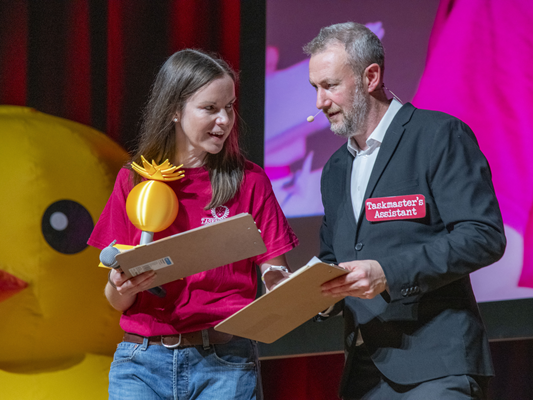Universities’ life-changing work relies on the collective effort of many dedicated and talented experts. Alongside researchers and lecturers, the value of higher education is underpinned by PhD supervisors, community outreach teams, technicians, librarians and international collaboration leads, to name a few. As we approach the end of an undeniably bruising year for UK and Irish higher education, it feels more important than ever to celebrate – and learn from – the achievements of so many individuals and institutions, working tirelessly to meet the sector’s myriad challenges. In this collection, we showcase the insights and innovations of shortlisted academics and teams in the 2025 Times Higher Education Awards. Advice ranges from funding paths for tech founders to using allyship to support person-centric supervision.
Most Innovative Teacher of the Year
Innovation in the classroom, whether it takes its cue from technology or aims to boost inclusivity, always comes back to connection with people. These shortlisted educators have created novel ways to help students thrive in their studies and in the workplace.
Use games to get students back to class: Gamified learning can transform passive teaching into student-centred experiences. Matthew Jones of the University of Salford offers practical advice.
Three easy tweaks to make your teaching autism-friendly: Cora Beth Fraser of The Open University explains how teaching staff can address the dropout rate among autistic students.
Try a ‘not by the book’ teaching approach for industry-focused learning: Replace exams with real-world projects to prepare business students for dynamic careers, writes Marie Taillard of ESCP Business School.
How to harness AI for student support: Zemin Chen of the University of Lancashire shares lessons for taking a human-centred approach to bringing GenAI into the classroom.
Outstanding Research Supervisor of the Year
As these seasoned supervisors explain, shepherding a PhD candidate from refining their research question to preparing for their viva extends well beyond mentoring. Success in this high-wire act requires an understanding of the disciplinary field, the research process, potential pitfalls and human nature. Find out how to bring out the best in your doctoral students.
How to train PhD Jedi: By fostering candidates’ independence, creativity and diversity, supervisors can bring out the superpowers in the next generation of scientific leaders, says Lars Chittka of Queen Mary University of London.
How to support humanities PhD students with ethics applications: As creative and digital research grows within the humanities, PhD supervisors can help their students approach the ethics approval process thoughtfully and productively. Josie Barnard from De Montfort University explains how.
Using allyship, creativity and decolonising practice to reimagine PhD supervision: Ursula Hurley of the University of Salford explains how a person-centred approach can transform outcomes for postgraduate researchers from diverse and non-traditional backgrounds.
The secret to successful collaborative arts and humanities PhD research: Insights into managing collaborative relationships in arts and humanities PhD research, based on Alastair Owens’ experience with museums and doctoral students at Queen Mary University of London.
Knowledge Exchange or Transfer Initiative of the Year
Commercialising research and community outreach are two of the ways universities can extend the economic and social benefits of their work beyond campus. As these articles show, that can mean harnessing millions in investment, co-developing solutions to real-world problems or forging deeper community connections.
From lab to London Stock Exchange – six lessons for quantum tech founders: Three collaborators from Lancaster University share practical lessons from transforming quantum research into a public company with a £14.8 million valuation.
Mind the gap! How an industry-university partnership brought theory into practice: Communication, flexibility and a shared commitment to the bigger picture kept this research collaboration on track, as Xiaojun Zhai from the University of Essex and Railscape’s Michael Hayes explain.
Lessons from first-time festival planners: Co-creating a large-scale public event can seem daunting when resources or experience are scant. Here, a team from the University of Chester shares advice from developing a festival of ideas from scratch.
International Collaboration of the Year
International collaborations sound impressive on paper but many fail to move beyond initial enthusiasm and a signed memorandum of understanding, as one academic below explains. All these articles offer a road map for success in working across borders, even in the face of barriers as grave as war.
Building legal resilience in Ukraine: Erica Arthur from the University of Birmingham shares lessons on how a UK-Ukrainian university partnership overcame challenges of war, and working across borders, to produce a new legal dictionary.
The dos and don’ts of developing an international network in higher education: Jeremy Howick from the University of Leicester shares lessons from building a global network focused on empathy in healthcare, with no initial funding.
Seeing is believing, or how to make internationalisation count: Internationalisation needs to demonstrate impact and return on investment – and to do that, it needs to be seen, writes Michael Scott from the University of Warwick.
Outstanding Technician of the Year
Often unsung, technical professions contribute to universities’ research and impact in ways that can far exceed their already-considerable value to laboratories and classrooms. These shortlisted technicians highlight how their expertise can enhance funding bids, communication and efficiency.
Connecting and empowering technical staff: Technicians might have answers to the challenges they face but their roles are often siloed or isolated. John Nicolson from the University of Cambridge offers suggestions for building networks and communication.
How research technical professionals can enhance research infrastructure funding bids: Technicians don’t just contribute to best practice and equipment sustainability, they can boost bids for investment in infrastructure, writes Alex Laude from Newcastle University.
Technical knowledge and expertise are more valuable than you think: Involving technical staff in decision-making committees can lead to more efficient practices and remove siloed thinking or practices, explains Jiteen Ahmed from Aston University.
Outstanding Contribution to the Local Community
The understanding that trust with the local community is slowly built but quickly destroyed underpins much effective community outreach. These shortlisted university civic projects address broad societal problems – from supporting a living wage to improving children’s eye health – with open communication and a commitment to long-term partnerships.
Why universities must step up their efforts as civic institutions: As major employers and powerful civic institutions, universities have the opportunity – and responsibility – to work with local communities to drive meaningful change, argue Farhan Samanani and Michael Bennett from King’s College London.
‘We stopped talking at communities and started working with them’: A “new” approach to building meaningful community-university relationships results in connection and true partnership. Kimberley Simms and Luke Parmenter from Nottingham Trent University explain how it works.
A clear vision for university-community partnerships: A team from Aston University and Aston Villa Football Club shares how a project to improve local children’s eye health grew into an ongoing partnership.
A community-university partnership is a relationship, not an affair: Long-term, mutual benefits of civic engagement require time, trust and persistence to emerge, write three academics from Cardiff University.
Outstanding Contribution to Equality, Diversity and Inclusion
From safe spaces for everyone on campus to be themselves, to finding funding for EDI-focused projects and inclusive recruitment practices, these initiatives show how to take EDI work beyond rhetoric into meaningful support.
Empower LBGTQ+ people to be their authentic selves on campus: A simple, low-cost idea helped make campus more welcoming for the LGBTQ+ community. Rafael Henry-Venson and Emily Nordmann from the University of Glasgow outline how rainbow office hours work.
Show, not just say, that your institution is a place for everyone: Moni Akinsanya from Liverpool John Moores University explains how a fund for inclusive projects puts money and strategy behind words.
Let’s rethink recruitment for an inclusive university culture: How can universities tweak the hiring process to allow every candidate to show what they can do? Rachael Cornwall from Buckinghamshire New University shares advice.
Outstanding Library Team of the Year
No longer hubs of studious silence and dusty volumes, university libraries have proved their agility time and time again, in response to the pandemic, open access, generative AI and evolving institutional resources and needs.
‘Our strength lies in our small size’: Sarah d’Ardenne of the Royal Northern College of Music explains how a specialist academic library has used a student-focused approach to provide bespoke support.
Honour the university library as a creative space with an artist residency: Inviting artists to use library space can turn it into a hub of innovation, exhibitions and community art. The team at the Royal College of Art outlines how.
Librarians, it’s time to lead the way: Since GenAI landed, the Birmingham Newman University library team has adopted a holistic approach to guide student use and policy development, as Chris Porter explains.
Outstanding Support for Students
Effective student support demands that teams think at scale while also providing services that address individual need. The work outlined here ranges from student mental health services to ensuring that neurodiverse and STEM students from non-traditional backgrounds are able to continue with their studies.
Support students’ mental health with bespoke workshops: A partnership with St John Ambulance offered Manchester Metropolitan University a practical way to show students how to ask for help when they need it. Lisa Simmons explains how it worked.
How to help autistic students adjust to life on campus: Tabitha Biller from De Montfort University offers advice for easing autistic students into their university career, from neurodiversity-friendly socialising to reducing their anxiety with a furry friend.
‘Support is not remedial. It is pedagogy’: With STEM foundation years being key to widening participation, Hannah Seale and Darryl Morgan from the University of South Wales detail how to make them supportive and structured, with well-being at the centre.
Thank you to all who contributed their expertise and insight to this collection.
If you would like advice and insight from academics and university staff delivered direct to your inbox each week, sign up for the Campus newsletter.




comment